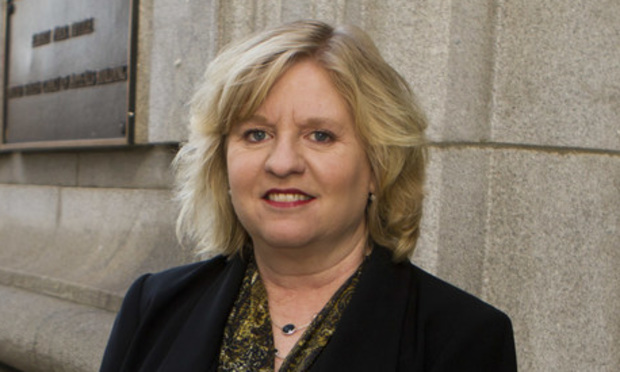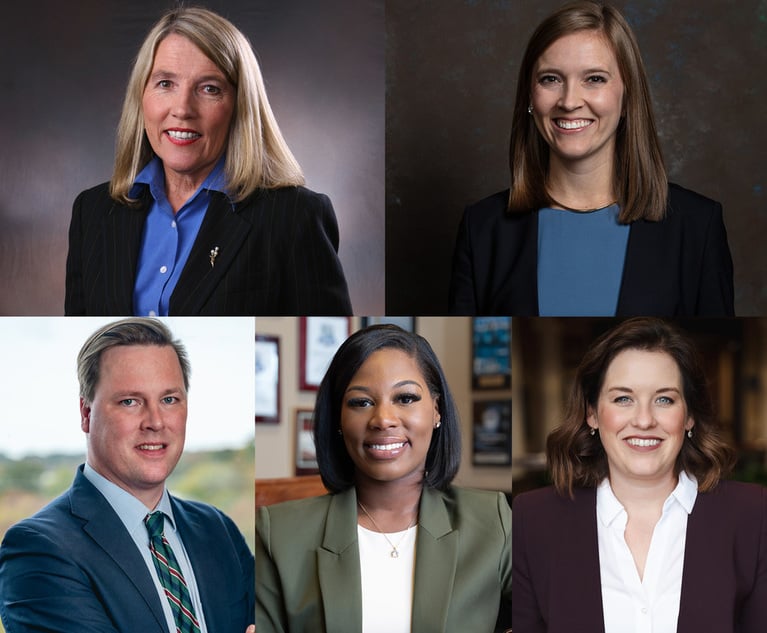11th Circuit Revives False Claims Lawsuit in Three-Way Circuit Split
In reversing an Alabama judge, the Eleventh Circuit Court of Appeals held that the False Claims Act's statute of limitations for bringing a claim starts when the government learns of the fraud, not when the whistleblower finds out about it.
April 19, 2018 at 10:33 AM
6 minute read

The Eleventh Circuit Court of Appeals has revived a False Claims Act lawsuit accusing two military contractors in Iraq of bribery and bid-rigging.
The lawsuit was brought by a former employee who served 10 months in prison before blowing the whistle on “rampant war-time contract fraud” worth millions of dollars. A federal judge in Alabama dismissed the lawsuit, writing that Billy Joe Hunt missed the applicable three-year deadline for bringing his claims against Pasadena, California's Parsons Infrastructure & Technology and Florida-based Cochise Security.
The appellate opinion sets up a three-way split with other circuits' interpretation of the FCA's tolling deadlines.
The published Eleventh Circuit opinion, released April 11, was written by Judge Jill Pryor with the concurrence of Judge Charles Wilson and, sitting by designation, Judge Harvey Bartle III of Pennsylvania's Eastern District.
At issue are the FCA rules governing qui tam actions, which allow a whistleblower or relator to bring claims for violations on behalf of the government in return for a share of any recovered proceeds.
There are two deadlines that may apply in filing a complaint alleging a FCA violation. The first requires the lawsuit to be filed within six years after the violation occurred, and the second provides a three-year limit from the time the appropriate government body is made aware of the violation.
“The question we answer today, which is one of first impression, is whether [the FCA's] three year limitations period applies to a relator's FCA claim when the United States declines to intervene in a qui tam action,” Pryor wrote.
While Hunt may have known of the fraud more than three years before he sued, “his allegations show that he filed suit within three years of the date when he disclosed facts material to the right of action to United States officials and within ten years of when the fraud occurred.”
“[B]ecause the FCA provides that this period begins to run when the relevant federal government official learns of the facts giving rise to the claim, when the relator learned of the fraud is immaterial for statute of limitations purposes,” she wrote.
According to his complaint and other filings, Hunt was a manager for Parsons in 2014 when it was awarded a $60 million contract in 2004 to clean up excess munitions left behind by enemy combatants. Among the contract's requirements was the provision of security for the staff and subcontractors working on the project.
The security contract was awarded to ArmorGroup but, Hunt said, an Army Corps of Engineers contracting officer, who was close to Cochise's president, intervened after being “bribed with trips and gifts.”
That officer forged a document rescinding the contract, which was ultimately awarded to Cochise. The company provided security for nine months in 2006, charging more than an additional $1 million per month than ArmorGroup would have. Other expenses included nearly $3 billion in armored vehicles the government had to supply because Cochise had none of its own.
When the officer alleged to have taken the payoffs rotated out of Iraq, Parsons rebid the contract and awarded it to ArmorGroup.
Hunt was interviewed by Federal Bureau of Investigation agents in 2010 about a separate kickback scheme. He cooperated with the FBI, Department of Justice and Internal Revenue Service, and told investigators about the Cochise affair as well.
Hunt pleaded guilty in 2012 to filing a false tax return and conspiracy. He served 10 months and was ordered to pay restitution.
In 2013, he sued Cochise and Parsons in Alabama's Northern District under the FCA. The government declined to intervene in 2015 but allowed the case to continue in the name of the United States, as permitted by the FCA.
The defendants moved for dismissal after the government's decision, arguing the claim was barred by the six-year statute of limitations, and that Hunt had waited more than seven years after the alleged fraud to file suit.
Hunt argued that he sued within three years of the government finding out, but District Judge R. David Proctor agreed with the defense and tossed the lawsuit.
Proctor ruled that the three-year limit didn't apply because the government did not intervene and that Hunt had missed the six-year deadline.
Proctor's ruling noted that federal courts have interpreted the FCA's statute of limitations in three different ways: that the three-year limit only applies to the government and not to qui tam relators at all; that the limit does apply to relators but that the clock starts when the relator learns about the underlying fraud; and—the interpretation Hunt argued—that the clock doesn't start until the government learns of the fraud.
While Proctor noted that the Eleventh Circuit “has not weighed in on whether a relator is entitled to take advantage of the FCA's three-year statutory tolling provision in a published decision.”
But, he said, “no circuit has accepted this tortured interpretation” of the law.
In reversing Proctor, Pryor wrote that nothing in the act's legislative history indicated that a shorter time limit should apply when the government decides not to intervene.
Pryor's opinion acknowledged that there is split with other circuits on the issue, but said the text of the FCA “unambiguously identifies a particular official of the United States as the relevant person whose knowledge causes the limitations period to run,” and rejected any “inconsistent interpretation” of the act.
Hunt is represented by Gary Conchin of Huntsville's Conchin Cloud & Cole, and Christopher Day and Earl Mayfield III of Fairfax, Virginia's Juris Day.
Mayfield said the Fourth, Fifth and Tenth Circuits have ruled the three-year limit doesn't apply to relators at all, while the Third and Ninth circuits embraced the position that the clock starts when the relator learns about the fraud.
“We're glad the Eleventh Circuit took the opportunity to expand the FCA instead of reducing it, and we're hoping that that view will prevail nationwide,” Mayfield said.
Cochise and Parsons are represented by James Carter, Aaron Dyer and Michael Rizzo of Los Angeles' Pillsbury; Duane Daiker and Robert Warchola of Tampa's Shumaker Loop & Kendrick; and Jeffrey Doss and Jackson Sharman III of Birmingham's Lightfoot, Franklin & White.
They did not respond to requests for comment.
This content has been archived. It is available through our partners, LexisNexis® and Bloomberg Law.
To view this content, please continue to their sites.
Not a Lexis Subscriber?
Subscribe Now
Not a Bloomberg Law Subscriber?
Subscribe Now
NOT FOR REPRINT
© 2025 ALM Global, LLC, All Rights Reserved. Request academic re-use from www.copyright.com. All other uses, submit a request to [email protected]. For more information visit Asset & Logo Licensing.
You Might Like
View All

Plaintiffs Attorneys Awarded $113K on $1 Judgment in Noise Ordinance Dispute
4 minute read
'Didn't Notice Patient Wasn't Breathing': $13.7M Verdict Against Anesthesiologists
12 minute readTrending Stories
- 1New York-Based Skadden Team Joins White & Case Group in Mexico City for Citigroup Demerger
- 2No Two Wildfires Alike: Lawyers Take Different Legal Strategies in California
- 3Poop-Themed Dog Toy OK as Parody, but Still Tarnished Jack Daniel’s Brand, Court Says
- 4Meet the New President of NY's Association of Trial Court Jurists
- 5Lawyers' Phones Are Ringing: What Should Employers Do If ICE Raids Their Business?
Who Got The Work
J. Brugh Lower of Gibbons has entered an appearance for industrial equipment supplier Devco Corporation in a pending trademark infringement lawsuit. The suit, accusing the defendant of selling knock-off Graco products, was filed Dec. 18 in New Jersey District Court by Rivkin Radler on behalf of Graco Inc. and Graco Minnesota. The case, assigned to U.S. District Judge Zahid N. Quraishi, is 3:24-cv-11294, Graco Inc. et al v. Devco Corporation.
Who Got The Work
Rebecca Maller-Stein and Kent A. Yalowitz of Arnold & Porter Kaye Scholer have entered their appearances for Hanaco Venture Capital and its executives, Lior Prosor and David Frankel, in a pending securities lawsuit. The action, filed on Dec. 24 in New York Southern District Court by Zell, Aron & Co. on behalf of Goldeneye Advisors, accuses the defendants of negligently and fraudulently managing the plaintiff's $1 million investment. The case, assigned to U.S. District Judge Vernon S. Broderick, is 1:24-cv-09918, Goldeneye Advisors, LLC v. Hanaco Venture Capital, Ltd. et al.
Who Got The Work
Attorneys from A&O Shearman has stepped in as defense counsel for Toronto-Dominion Bank and other defendants in a pending securities class action. The suit, filed Dec. 11 in New York Southern District Court by Bleichmar Fonti & Auld, accuses the defendants of concealing the bank's 'pervasive' deficiencies in regards to its compliance with the Bank Secrecy Act and the quality of its anti-money laundering controls. The case, assigned to U.S. District Judge Arun Subramanian, is 1:24-cv-09445, Gonzalez v. The Toronto-Dominion Bank et al.
Who Got The Work
Crown Castle International, a Pennsylvania company providing shared communications infrastructure, has turned to Luke D. Wolf of Gordon Rees Scully Mansukhani to fend off a pending breach-of-contract lawsuit. The court action, filed Nov. 25 in Michigan Eastern District Court by Hooper Hathaway PC on behalf of The Town Residences LLC, accuses Crown Castle of failing to transfer approximately $30,000 in utility payments from T-Mobile in breach of a roof-top lease and assignment agreement. The case, assigned to U.S. District Judge Susan K. Declercq, is 2:24-cv-13131, The Town Residences LLC v. T-Mobile US, Inc. et al.
Who Got The Work
Wilfred P. Coronato and Daniel M. Schwartz of McCarter & English have stepped in as defense counsel to Electrolux Home Products Inc. in a pending product liability lawsuit. The court action, filed Nov. 26 in New York Eastern District Court by Poulos Lopiccolo PC and Nagel Rice LLP on behalf of David Stern, alleges that the defendant's refrigerators’ drawers and shelving repeatedly break and fall apart within months after purchase. The case, assigned to U.S. District Judge Joan M. Azrack, is 2:24-cv-08204, Stern v. Electrolux Home Products, Inc.
Featured Firms
Law Offices of Gary Martin Hays & Associates, P.C.
(470) 294-1674
Law Offices of Mark E. Salomone
(857) 444-6468
Smith & Hassler
(713) 739-1250







